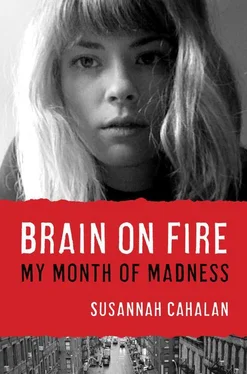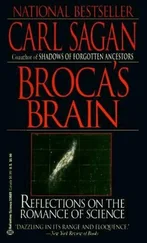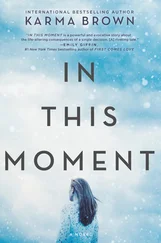Finally, he sat down on the bed near me. He turned to my parents and said, “Her brain is on fire.” He took my small hands into his large ones and leaned down to my eye level. “I’m going to do everything I can for you. I promise I will always be there for you.”
For a moment, I seemed to come alive, he would later recall to me. I’ll always regret that I remember nothing of this pivotal scene, one of the most important moments of my life.
Dr. Najjar saw tears gather at the corners of my eyes. I sat up and threw my arms around him. For him, it was another crucial moment in my case: he could sense that I was still in there, somewhere. But it was just a blip. After that outpouring, I lay back down and dozed off, exhausted by the brief display of emotion. But he knew I was there, and he would not give up on me. He motioned for my parents to follow him outside the room.
“Her brain is on fire,” he repeated. They nodded, eyes wide. “Her brain is under attack by her own body.”
Dr. Najjar’s news didn’t end there. “The next course of treatment, I feel, should be steroids, but we need to confirm the inflammation before moving on,” he said.
“How?” my mother asked.
“There is a doctor at the University of Pennsylvania who specializes in autoimmune disease, and I believe he will have the answers we are looking for. Meanwhile,” he paused, knowing my parents would not be pleased by what he was about to say, “there are several ways we can go with this. There are the steroids. There is plasmapheresis. There is IVIG.”
My parents nodded again, in unison, entirely taken by this force of a man.
“But I think the best thing to do,” he said, lowering his voice, “is to do a brain biopsy.”
“What does that mean?” my mother asked quietly.
“We would need to look at her brain and take a small”—he put two fingers up and separated them by a centimeter—“piece of her brain.”
My father bristled. “I don’t know about that.”
“I promise you that if it she were my child, I would do a brain biopsy. The risks of not doing it far outweigh the risks of doing it. The worst thing that can happen is that we end up in the same place we are now.”
They didn’t say a word.
“I want to do this Monday, Tuesday at the latest,” he said. “But it is up to you. In the meantime, I will talk it over with the team and the surgeon. Let me think about it. And I will let you know.”
As Dr. Najjar walked away, my mother whispered, “He’s a real-life Dr. House.”
Later that afternoon, Dr. Russo arrived to confirm to my parents that the team’s decision was to move forward with a brain biopsy. My mom tried to remain calm, but she felt helpless. She motioned for Dr. Russo to join her outside the room in the hallway. She had so many questions for her, but all she could grasp on to were those two simple, bone-chilling words: brain biopsy. After weeks of maintaining a facade of composure, she had finally hit her breaking point and started to sob. Dr. Russo stood with her hands crossed over her chest and then reached out and ever so slightly touched my mother’s arm.
“It’s going to be fine,” Dr. Russo said.
My mom wiped her tears and took a deep breath. “I better go back in.”
When she returned, my dad threw her an accusatory glance. “We heard you,” he said.
Despite his gruffness, as he would later write in his journal, he felt the same concerns as my mother: “The very sound of a brain biopsy scared me. I could hear my mother’s voice telling me not to do it. I could hear her tell me to never let anyone mess with the brain. She had seen a lot of bad things happen as an RN and she didn’t trust brain surgeons. I had to remind myself how long ago that was.”
Depleted by the morning’s events, the clock drawing, and the brain biopsy news, my dad walked across town from NYU to Thirty-Third Street, to catch the subway on Park Avenue South. Between First and Second Avenues, he spotted the Chapel of the Sacred Hearts of Jesus and Mary. Impulsively, he walked into the chapel, admiring the stained glass windows and the vibrant painting of an angel wrapping her arms around a broken man. He got on his knees and prayed.
That same afternoon, downtown in the Manhattan district attorney’s office, my mom was doing something similar. She held hands with her secretary, Elsie, and her coworker Regina, who was also a Baptist minister. All three closed their eyes and held hands in a circle as Regina’s voice rose high above them: “God, cure this young lady. God, hear us, hear our prayers. We pray for you to cure this girl and make her better. Hear our prayers. Please hear our prayers.” My mom, a no-nonsense agnostic Jewish girl from the Bronx, now swears she felt the presence of God.
I was blissfully unaware of my parents’ anguish. I texted my college friend Lindsey, who lived in St. Louis: “I’m getting a briannopsy!”
“What? What do you mean?” Lindsey wrote back, confused by the misspelling.
“They’re taking a peece of my brain!”
My friend Zach, who was splitting cat-sitting duties with another coworker and friend, Ginger, called that day as well. I shared the news in the same manner that I would have told him what I had for lunch.
“I’m having a brain opsy,” I said.
“Hold on, Susannah. They’re doing surgery on your brain ?” he asked, clearly concerned. It was the first time that someone had expressed to me directly how distressing the surgery sounded. I began to cry tears of fear and confusion and finally hung up, too upset to continue with the conversation.
It was Easter weekend. On Saturday, the surgeon’s head nurse arrived to describe the preparation for the brain surgery. She seemed upbeat and managed to make the biopsy sound routine. This did not quell my father’s fears. As she described where they were going to shave my head—the front part above my right forehead about four inches in toward the crown—I listened impassively, and my dad was impressed by my dignity. It was only later that night that I began to break down. Seeing me upset made my dad cry too. Then he heard me laughing.
“You look funny when you cry,” I giggled. Suddenly we were both laughing and crying. Through his tears, he reminded me of our motto.
“What’s the slope of the line?”
“Um.” I couldn’t remember the answer.
“Positive. And what does that mean?”
“Um.” I moved my arm upward, indicating progress.
“Right. Getting better every day.”
The next day was Easter morning, and my dad brought me an Easter basket, the same basket he had given to me since I was a child, filled with chocolates and jellybeans. He was delighted to see me looking like a kid again, eyes wide, ready to pounce on the candy.
My parents arrived extra early on Monday morning, filled with both dread and excitement. For my part, I seemed unnaturally calm. Eventually an orderly, whom they thought looked like a Hells Angel, put me on a stretcher and wheeled me down into surgery. My parents hung back for a few seconds. Setting aside years of betrayal, emotional estrangement, and petty fights, they briefly exchanged a hug and a few quiet tears.
The OR was the embodiment of medicine on an industrial scale, a sterile place with doors snaking into dozens of operating theaters. Gone were the landscape paintings and soothing music; this was where the serious surgeries happened. We waited in the area immediately in front of the elevators, held back by large, clear vertical blinds. Everyone on the other side of the blinds wore surgical scrubs.
Читать дальше













